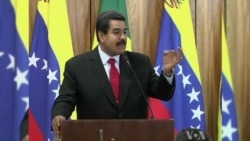In Venezuela, the laws of supply and demand are undermining the socialist revolution started by the late President Hugo Chavez. Since Chavez’s hand-picked successor Nicolas Maduro won the Venezuelan presidential election in April - by a margin of less than 2 percent - high inflation and a shortage of staple goods are now leading many on both sides of this politically-divided country to question whether its current economic course is sustainable.
Recently, toilet paper has been in short supply in Venezuela. The situation improved only after the National Assembly approved funding to increase needed foreign imports. Shortages of staple goods have become common occurrences in this rich country with the third-largest oil reserves in the world. Many economists blame the socialist policies of the late President Hugo Chavez. He instituted price controls on some products to curb inflation, resulting in both reduced domestic production and high inflation after the controls were lifted. Currency exchange controls have also restricted foreign imports.
Latin American analyst Diana Negroponte, with the Brookings Institution, says this is a crisis for newly-elected President Nicolas Maduro who must impose free-market reforms before the economy implodes or face dire political consequences.
“If he pursues the ideological outcome he is destined to fail. And rumbling of protests from within his own party will lead to impeachment," said Negroponte.
However, Mark Weisbrot with the Center for Economic and Policy Research, says all that is needed to end scarcity and stabilize the nearly 30 percent rate of inflation is easing currency exchange controls.
“This isn’t the hyper-inflation or anything like this. They’ve hit this rate of inflation before and it came down. You know if you look at the last quarter of last year, right before that inflation was running at an annual rate of 13.3 percent," said Weisbrot.
Increased political polarization is also fueling the current crisis. Opposition candidate Henrique Capriles continues to contest the close election results. President Maduro has rejected a vote recount but some of his recent appointments, like Finance Minister Nelson Merentes, indicate he is open to pragmatic change. Still, Mark Schneider with the International Crisis Group says Maduro must do more, including appointing opposition members to the cabinet.
“Something needs to be dialogue, consensus, reconciliation, and some degree of accommodation when you have half of the country on one side of the divide and the other half on the other side of the divide and the economic situation is deteriorating," said Schneider.
In post-Chavez Venezuela, he says, both sides of the political aisle must put the national interest over partisan concerns to deal with problems that affect rich and poor alike.
Recently, toilet paper has been in short supply in Venezuela. The situation improved only after the National Assembly approved funding to increase needed foreign imports. Shortages of staple goods have become common occurrences in this rich country with the third-largest oil reserves in the world. Many economists blame the socialist policies of the late President Hugo Chavez. He instituted price controls on some products to curb inflation, resulting in both reduced domestic production and high inflation after the controls were lifted. Currency exchange controls have also restricted foreign imports.
Latin American analyst Diana Negroponte, with the Brookings Institution, says this is a crisis for newly-elected President Nicolas Maduro who must impose free-market reforms before the economy implodes or face dire political consequences.
“If he pursues the ideological outcome he is destined to fail. And rumbling of protests from within his own party will lead to impeachment," said Negroponte.
However, Mark Weisbrot with the Center for Economic and Policy Research, says all that is needed to end scarcity and stabilize the nearly 30 percent rate of inflation is easing currency exchange controls.
“This isn’t the hyper-inflation or anything like this. They’ve hit this rate of inflation before and it came down. You know if you look at the last quarter of last year, right before that inflation was running at an annual rate of 13.3 percent," said Weisbrot.
Increased political polarization is also fueling the current crisis. Opposition candidate Henrique Capriles continues to contest the close election results. President Maduro has rejected a vote recount but some of his recent appointments, like Finance Minister Nelson Merentes, indicate he is open to pragmatic change. Still, Mark Schneider with the International Crisis Group says Maduro must do more, including appointing opposition members to the cabinet.
“Something needs to be dialogue, consensus, reconciliation, and some degree of accommodation when you have half of the country on one side of the divide and the other half on the other side of the divide and the economic situation is deteriorating," said Schneider.
In post-Chavez Venezuela, he says, both sides of the political aisle must put the national interest over partisan concerns to deal with problems that affect rich and poor alike.






